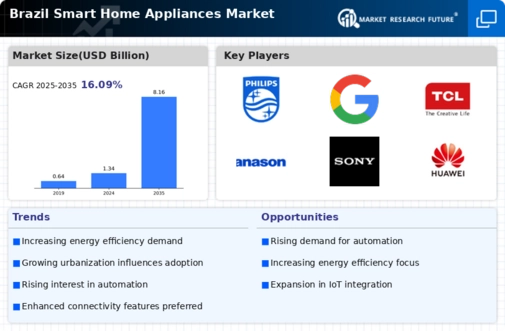Growing Urbanization
The rapid urbanization in Brazil is a pivotal driver for the smart home-appliances market. As more individuals migrate to urban areas, the demand for innovative and efficient home solutions increases. Urban dwellers often seek convenience and enhanced living standards, which smart home appliances can provide. In 2025, approximately 87% of Brazil's population resides in urban areas, leading to a surge in the adoption of smart technologies. This trend indicates a shift towards modern living, where smart appliances play a crucial role in daily life. The integration of these devices not only enhances comfort but also promotes energy efficiency, aligning with the preferences of urban consumers. Consequently, the smart home-appliances market is likely to experience substantial growth as urbanization continues to shape consumer behavior and preferences.
Environmental Awareness
Increasing environmental awareness among Brazilian consumers is driving the smart home-appliances market. As sustainability becomes a priority, individuals are more inclined to invest in energy-efficient appliances that reduce their carbon footprint. In 2025, it is estimated that around 60% of consumers in Brazil consider energy efficiency a crucial factor when purchasing home appliances. This shift in consumer mindset encourages manufacturers to develop products that not only meet performance standards but also align with eco-friendly practices. The demand for smart appliances that offer energy-saving features is likely to grow, reflecting a broader trend towards sustainable living. Thus, the smart home-appliances market is positioned to expand as environmentally conscious consumers seek solutions that contribute to a greener future.
Rising Disposable Income
The increase in disposable income among Brazilian consumers is a significant driver for the smart home-appliances market. As economic conditions improve, households are more willing to invest in high-quality, technologically advanced appliances. In 2025, the average disposable income in Brazil is projected to rise by approximately 5%, allowing consumers to prioritize smart home solutions that enhance convenience and efficiency. This trend indicates a shift in consumer spending habits, where individuals are more inclined to purchase smart appliances that offer long-term savings and improved quality of life. Consequently, the smart home-appliances market is likely to benefit from this growing financial capability, as more consumers seek to upgrade their homes with innovative technologies.
Enhanced Security Features
The increasing concern for home security is a notable driver for the smart home-appliances market in Brazil. As crime rates fluctuate, consumers are becoming more proactive in safeguarding their homes. Smart appliances equipped with advanced security features, such as surveillance cameras and smart locks, are gaining popularity. In 2025, it is projected that approximately 40% of Brazilian households will incorporate smart security solutions into their homes. This trend indicates a growing recognition of the importance of safety and security in residential settings. As manufacturers respond to this demand by integrating security functionalities into their products, the smart home-appliances market is likely to witness significant growth, driven by consumers' desire for enhanced protection and peace of mind.
Technological Advancements
Technological advancements are significantly influencing the smart home-appliances market in Brazil. Innovations in IoT (Internet of Things) and AI (Artificial Intelligence) are enabling the development of more sophisticated and user-friendly appliances. In 2025, it is estimated that the penetration of smart devices in Brazilian households will reach around 35%, reflecting a growing acceptance of technology in everyday life. These advancements allow for seamless integration and automation, enhancing the overall user experience. Moreover, as consumers become more tech-savvy, their expectations for smart appliances evolve, driving manufacturers to innovate continuously. This dynamic environment suggests that the smart home-appliances market will thrive as technology continues to advance, offering new functionalities and improved efficiency.















